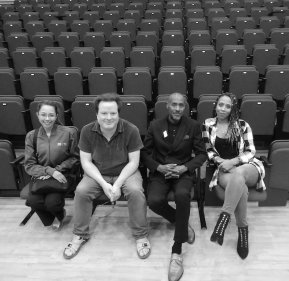Symposium programme:

Conference held on 17 July 2019, at the University of Wolverhampton. Some images from the day:
Diva
Hip-Hop, Feminism, Fierceness
˭
Centre for Film, Media, Discourse & Culture
University of Wolverhampton
17 July 2019
Twitter hashtag for the day: #DivaWlv
[Full programme as a Word document: DivaProgrammeAbstracts]
9.35: Welcome: Dr Benjamin Halligan (MK045, George Wallis Building)
9.40 – 10.30: Keynote 1: Dr. Shara Rambarran:
Proceed with Caution: Mariah Carey – the Ultimate Diva and Womxn Empowerment Influencer in Current Popular Music and Culture?
(MK045, George Wallis Building)
10.30 – 10.40: Break
Parallel panels
10.40 – 12.00: Panel 1a: Goddesses: Cardi B, Minaj, Amuro (Chair: Dr Fran Pheasant-Kelly)
(MK045, George Wallis Building)
Dr Gemma Flynn: Bloody Shoes and Money Moves: Cardi B and the Cultural Currency of Gang Violence for Women in Hip Hop
Aliyah Rawat: From Barbie to Bad Bitch: Black Female Sexuality, Cultural Politics and Subversion in the Visual Performance of Nicki Minaj
Dorothy Finan: Namie Amuro: Japan’s diva of the post-modern era
10.40 – 12.00: Panel 1b: Divas Then and Now: Herstories, Pathbreakers, Industry (Chair: Anne-Marie Beaumont)
(MK211, George Wallis Building)
Harriet Reed: Diva Worship from Antiquity to Instagram
Amy Harris: “Kicking ass is literally all I care about”: the trailblazing rap of queer feminist Bruja, Princess Nokia
Dr. Mary Gani: Negotiating like a Diva: Creative Autonomy in the Music Industry
12.00 – 1.30: Lunch
1.30 – 2.20: Keynote 2: Dr Kirsty Fairclough:
I Slay: Beyoncé as Intersectional Feminist, Activist and Diva
(MK045, George Wallis Building)
Parallel panels
2.25 – 3.55: Panel 2a: Performing and Performance: Houston / Minaj / Noname / Cardi B
(Chair: Dr Shara Rambarran)
(MK045, George Wallis Building)
Gwynne George: Performing Creative Labour: Whitney Houston on MTV, 1985-88
Dr Anna-Elena Pääkkölä: Nicki Minaj’s “Anaconda”: Intersectional Feminist Fat Studies, Sexuality, and Embodiment
Michail Exarchos (aka Stereo Mike): Power, identity, reflexivity and independence in Noname’s Room 25: Slams, raps and lyrical sonification
Charis Dishman: “That’s how I got pregnant y’all”: Cardi B and (Un)respectability
2.25 – 3.55: Panel 2b: Beyoncé & Solange (Chair: Dr Kirsty Fairclough)
(MK301, George Wallis Building)
Kate Naylor ‘Strong enough to bear the children then get back to business’: The Power of Beyoncé’s Body
Hannah Strong: Suck On my Balls, Bitch: A Paradigm Shift
Dr Kwame M. Phillips: The Imagined Things: On Solange, Repetition and Mantra
3.55 – 4.35: Break
4.35 – circa 6.15: Screening and keynote interview (Chair and interviewer: Natalie Graham)
(MC001, Millennium Building)
Aaliyah Live in Amsterdam (Windrush Productions; 51 mins)
Dr Pogus Caesar
6.15: Close of symposium
Informal drinks & networking: The Lighthouse, Wolverhampton (WV1 1HT)
Abstracts and Biographical Notes
Keynotes (in order of appearance):

Dr Shara Rambarran is a musicologist, academic, and writer from Essex. Since graduating in music from the University of Sheffield, Shara did most of her practitioner/industry work (performing, composing, production, and music PR) in London, before returning to the academia to specialise in popular musicology. After completing her PhD at the University of Salford (UK), Shara has remained in music education and has extensive experience in delivering programmes in popular music, music history, music industry/business, and cultural studies. Shara is the co-editor, with the late Prof Sheila Whiteley, of the Oxford Handbook of Music and Virtuality (University of Oxford Press, 2016).
As well as being a Fellow of the Higher Education Academy, Shara lectures at various HE institutions such as the University of York and Queen’s University (British campus). Currently, Shara is focused on writing and lecturing, and aims to return to performing and creating music in the near future.
In the meantime, Shara is passionate in researching on: remixology/post-production, digital technology, virtuality, electronica/dub, reggae, hip-hop, pop production, audio-visual aesthetics, media, cultural/critical theory, music industry, music education, and law.
Shara co-runs the Art of Record Production conferences, and serves on the journal editorial boards for The Art of Record Production and Journal of Popular Music Education. Shara currently lives in London.
@Sharadai

Dr Kirsty Fairclough is currently Associate Dean: Research and Innovation in the School of Arts and Media at the University of Salford, UK and Chair of the Board of Manchester Jazz Festival.
She has published widely on popular culture and is the co-editor of The Music Documentary: Acid Rock to Electropop (Routledge), The Arena Concert: Music, Media and Mass Entertainment (Bloomsbury) and Music/Video: Forms, Aesthetics, Media (Bloomsbury) and author of the forthcoming Beyoncé: Celebrity Feminism and Popular Culture (I.B Tauris) and co-author of American Cinema: A Contemporary Introduction (Palgrave).
Kirsty’s work has been published in Senses of Cinema, Feminist Media Studies, SERIES and Celebrity Studies journals and she has made several television and radio appearances.
Kirsty lectures internationally on popular culture, feminism and representations of women most notably at The Royal College of Music, Stockholm, The University of Copenhagen, Second City, Chicago, Columbia College Chicago, Middle Tennessee State University, Unisinos Brazil and Bucknell University, Pennsylvania.
She has significant experience in international partnership development, particularly in North America and developed the Salford Popular Culture Conference series with international partner universities, including I’ll See You Again in 25 Years, Twin Peaks and Generations of Cult Television: A Two Day International Conference (University of Salford, May 2015) and Mad Men: The Conference (Middle Tennessee State University, May 2016) and Purple Reign: An interdisciplinary conference on the life and legacy of Prince, a three day international academic conference hosted by the School of Arts and Media, University of Salford, UK and the Department of Recording Industry, Middle Tennessee State University, USA
https://drkirstyfairclough.co.uk/
@DrKFairclough

Pogus Caesar is a British photographer, conceptual artist, archivist, author, curator, television producer and director. He was born in St Kitts, West Indies, and grew up in Birmingham, England.
In 2018 Caesar was awarded an Honorary Doctorate by Birmingham City University for his outstanding contribution to the visual arts. He was also on the list of ‘175 Brummies Who Inspire.’ This included inspirational people across arts, business, education, sports and science who either hail from Birmingham or have made a significant contribution to the City in the past 175 years.
Caesar began his career as a pointillist painter, later photographing diverse communities in North and South America, India, West Indies, South Africa and Albania. He has documented prominent figures and historical events such as the Handsworth Riots in 1985, a significant period of social unrest. He often reworks 35mm negatives into new forms, challenging the notion of religion, sex, history and identity from a Black British perspective.
Considered an important visual record of black history, Caesar’s work has been exhibited widely and his photographs and artworks have been acquired by National Portrait Gallery, Victoria & Albert Museum, Mappin Art Gallery, Wolverhampton Art Gallery and Birmingham Museum and Art Gallery. In 2004, he established OOM Gallery in Birmingham, which represents his photographic archive worldwide.
He has also authored two photographic books, ‘Muzik Kinda Sweet‘ and ‘Sparkbrook Pride.’ In his foreword for the book, poet Benjamin Zephaniah says: “I love the ‘rawness’ of these photos, they have a sense of place, yet nothing is staged, and the only information Pogus gives us about those featured is how they define themselves, nothing more. We need no more.”
Alongside his work as a photojournalist and artist, Caesar has also had a successful career in television, producing and directing a wide range of programmes both in the UK and abroad for Central TV, Carlton Television and BBC TV.
Aaliyah Live in Amsterdam (Pogus Caesar, Windrush Productions)
In 1995, Windrush Productions gained exclusive access to the Amsterdam leg of Aaliyah’s European tour. As well as capturing live footage of the concert, Aaliyah and her late father agreed to be interviewed, in a series of intimate conversations, they speak openly about her musical influences, achievements hopes and dreams. The film captures a star in their ascendancy. As the story unfolds it provides fans with a rare insight into Aaliyah, and leaves us wondering how much she would have achieved had her life not been tragically cut short. Trailer: https://youtu.be/en99KwuxzC8
Pogus will be in converstion with Natalie Graham:
Natalie Graham is a Record Label owner, Music Manager, Executive Producer, Writer, BBC Radio Presenter and Compere. As manager of British Soul music pioneer and Pro-Chancellor of the University of Wolverhampton, Dr Jaki Graham, Natalie has been responsible for taking a major label signing with over 40 years experience in the industry, shaping them into an independent artist and orchestrating their resurgence, having kept abreast of the evolution within the sector.
As Executive Producer of two critically acclaimed albums and a label owner working with emerging talent, Natalie’s experience has developed from her years within business, touring and learning from some of the most influential and key players within music, from those behind the scenes at management and Executive levels to Soul, R&B, Hip-Hop and Motown icons of the past and present.
Due to Natalie’s knowledge and direct relationship with a variety of musical greats, the BBC approached her to present her own show which airs weekly on BBC WM. Natalie is also a sought after host and compere and sits on the board of the Arena Theatre in Wolverhampton.
Speaker Abstracts and Biographical Notes (in alphabetical order)
Charis Dishman (King’s College, London)
“That’s how I got pregnant y’all”: Cardi B and (Un)respectability
Historically, a politics of respectability has been central to the construction, representation and governance of the sexual and moral identities of black women in America. It has likewise informed much criticism and scholarship on black women rappers, who have often had their relevance and importance judged in accordance with how they are perceived to correspond to standards of ‘respectable’ behaviour.
During her pregnancy in 2018, rapper Cardi B employed a range of strategies that draw attention to and undermine this framework. These include incorporating musical and visual references to other pregnant black women performers Lauryn Hill and Beyoncé Knowles into her own performances; blurring lines between the various resonances their different star personas and physical bodies carry. Cardi also combines elements of respectable and irreverent dress, dance and language in performances to resist and challenge rules of respectability, progress, desirability and success for herself and for others.
Through analysis of three of Cardi’s performances during this time, I identify and discuss these strategies, and evaluate their potential impact within and beyond the realm of hip-hop.
Charis Dishman is a PhD candidate at King’s College, London. Her thesis is entitled: ‘”Where my girls at?”: (Re)locating women rappers in the study and history of hip-hop, 1988-2000.’ She has a BA in History and Comparative Literature from Queen Mary, University of London and an MSt in Women’s Studies from the University of Oxford.
Michail Exarchos (aka Stereo Mike) (London College of Music)
Power, identity, reflexivity and independence in Noname’s Room 25: Slams, raps and lyrical sonification
Transitioning from nomadic, introverted anonymity and slam poetics to Room 25 (2018) – her latest, bold and critically acclaimed rap album – Noname delivers fierce honesty, reflexive vulnerability and sharp political commentary, whilst sonifying her exploration of identity over ‘resonant’ live instrumentation (Younger, 2018). The paper traces Noname’s lyrical morphing across two albums (Telefone, 2016; Room 25, 2018), discusses her transition from introspection to existing ‘in multitudes’ (Martin and Warner, 2019), but also maps the relationship between her lyrical imagery and the sonics of the record production. On Room 25’s opening track Self, Noname raps: ‘My pussy teachin’ ninth-grade English / My pussy wrote a thesis on colonialism’ – ‘one of the greatest lines of the year’ according to Pitchfork’s glowing album review (Younger, 2018). On follow-up track Blaxploitation, she asserts: ‘I’m struggling to simmer down, maybe I’m an insomni-black / Bad sleep triggered by bad government / Write a think piece in the rap song, the new age covenant / If you really think I’m cooking crack, pass me the oven mitts’ – lyrics, according to Noname, ‘inspired by the production’ and envisioning Penny Proud as a political cartoon reacting to the funkiest of basslines (Martin and Warner, 2019). Importantly, Noname remains independent, uses the proceeds from Telefone to create Room 25, and turns down a label contract in what she regards as ‘a great year for female rappers’ (ibid.). The research explores sonic-lyrical interrelationships as potential variables in this phenomenon, examines the notion of ‘sonic cartoons’ (Zagorski-Thomas, 2014) as lyrical instigators, and extrapolates from Noname through to Tierra Whack and beyond, to trace and celebrate contemporary female rap power.
Martin, M. and Warner, G. (2019) ‘We Need To Exist In Multitudes’: Noname Talks Artistic Independence, Women In Rap. Available at: https://www.npr.org/2019/02/10/692701998/we-need-to-exist-in-multitudes-noname-talks-artistic-independence-women-in-rap-a?t=1560472867524 (Accessed: 14 June 2019).
Noname (2016) Telefone. Available at: https://music.apple.com/gb/album/telefone/1146038117 (Downloaded: 14 June 2019).
Noname (2018) Room 25. Available at: https://music.apple.com/gb/album/room-25/1436063073 (Downloaded: 14 June 2019).
Younger, B. (2018) Noname Room 25. Available at: https://pitchfork.com/reviews/albums/noname-room-25/ (Accessed: 14 June 2019).
Zagorski-Thomas, S. (2014). The Musicology of Record Production. Cambridge: Cambridge University Press.
Michail Exarchos (aka Stereo Mike) is a hip-hop musicologist and award-winning rap artist (MTV Best Greek Act 2008), with nominations for seven national video music awards and an MTV Europe Music Award. He is the Course Leader for Music Mixing and Mastering at London College of Music (University of West London), and his publications include articles for Popular Music journal, Routledge and the Journal of Popular Music Education. His self-produced album Xli3h has been included in the 30 Best Greek Hip-Hop albums of all time.
Dorothy Finan (University of Sheffield’s School of East Asian Studies) @dotfinan
Namie Amuro : Japan’s diva of the post-modern era
Divas define eras, and eras define divas. In Japan, the notion of era is especially integral to the discussion of popular culture; for example, female vocalist Misora Hibari is thought of as the diva of Japan’s Shōwa imperial era, which concluded in 1989, as she embodied the sense of “modernity” (Yano) that permeated the Shōwa.
As the subsequent imperial era of Heisei has recently concluded, one female pop star has now been crowned the “Diva of the Heisei Era”: Namie Amuro (Excite News; Nikkan Spa). Hailing from Okinawa, a set of tropical islands in the far south of Japan (Roberson), Amuro trained in a local entertainment academy for her Tokyo debut at the age of just 18. Why, despite not being the era’s top-selling female performer, does Amuro have such a claim to this title?
In this paper, I will argue that Amuro is Japan’s quintessential post-modern diva, in that she reflects Japan’s coming to terms with the end of its period of high economic growth, exemplifying a time of great innovation, expansion, and international exchange in the Japanese music industry whilst the economy as a whole foundered.
In addition, I will expand on recent scholarship about the national significance divas in the Japanese context (Miller and Copeland) to explore Amuro’s use of visual and musical styles associated with black femininity, her feminist image in the context of her relationship with prominent male producers, as well as her collaborations with other East Asian “divas”.
Excite News. ““Heisei No Utahime” to Ittara Dare? Mottomo Kokumin No Kioku Ni Nokotta Josei Kashu to Wa…(Who Was the ”Diva of the Heisei Era”? The Female Vocalist People Remember the Most Is…).” 31 May https://www.excite.co.jp/news/article/Sirabee_20162057772/. Accessed 11 June 2019.
Miller, Laura and Rebecca Copeland. Diva Nation: Female Icons from Japanese Cultural History. University of California Press, 2018.
Nikkan Spa. ““Heisei No Utahime to Ieba Dare?” O Tōhyō. Go-I Nakajima Miyuki, Ichi-I Wa…? (We Asked: ”Who Was the Diva of the Heisei Era?”. Nakajima Miyuki Came 5th, but Who Came 1st…?).” 27 February https://bit.ly/2Ziz41t. Accessed 11 June 2019.
Roberson, James E. “Uchinaa Pop: Place and Identity in Contemporary Okinawan Popular Music.” Critical Asian Studies, vol. 33, no. 2, 2001, pp. 211-242.
Yano, Christine R. “Diva Misora Hibari as Spectacle of Postwar Japan’s Modernity.” Vamping the Stage: Female Voices of Asian Modernities, edited by Andrew N. Weintraub and Bart Barendreght, University of Hawaiʻi Press, 2017, pp. 127-143.
Dorothy Finan is a 1st year PhD Student at the University of Sheffield’s School of East Asian Studies. She specialises in representations of adolescence in Japanese popular music, and is a Daiwa Scholar in Japanese Studies.
Dr Gemma Flynn (University of Edinburgh School of Law, Criminology Department)
Bloody Shoes and Money Moves: Cardi B and the Cultural Currency of Gang Violence for Women in Hip Hop
This paper will employ criminological research on the performative nature of female gang violence and its persistent relationship to ‘maleness’, to consider the related scripts which are employed in gaining legitimacy for women in hip hop.
Cardi B’s Bodak Yellow will be considered, alongside literature which frames gang violence as a resource in the struggle for status experienced acutely by those experiencing intersectional inequalities. More broadly this piece will consider the tendency for mirroring maleness as a script of empowerment for women in heightened settings of late capitalism.
Dr Gemma Flynn is a Criminologist at the University of Edinburgh, specialising in Gender Studies and Media Theory and their intersections with crime, deviance and justice. Dr Flynn recently presented her work on ‘Punishment & Spectacle’ at Harvard University, Northwestern University, the University of Illinois Chicago and the University of Edinburgh as part of which she gave papers on ‘My Beautiful, Dark, Twisted Fantasy: The Rise and Fall of Kanye West’ as well as ‘Kim Kardashian, Colin Kaepernick and The End of Mass Incarceration’. She also recently performed a Marxist Feminist comedy show on precarious work in academia at the Glasgow Comedy Festival.
Dr. Mary Gani (Independent Scholar)
Negotiating like a Diva: Creative Autonomy in the Music Industry
This paper discusses the legal landscape for creative autonomy within copyright law, and highlights the dynamics of the negotiation process for female recording artists. More specifically, it addresses the hurdles that female recording artists may experience, juxtaposed against the recent negotiating strategies or “power moves” that certain divas have made, in the protection of their creative autonomy. It thus establishes the contributions that certain divas have wittingly or unwittingly made to the discourse on creative autonomy.
The importance of creative autonomy for authors in cultural production cannot be over-emphasised, but appears to be under-explored. Copyright law vests ownership of creative works in the authors of such works, however, business interactions in the music industry feature the assignment and re-assignment of such rights. One of the effects of such interactions is the loss of “creative autonomy” for artists who are authors. Creative autonomy can also be jeopardized in the context of relationships with managers who can exert controlling influence on recording artists.
Artists have often encountered difficulty in negotiating for creative control, however, female artists may have experienced even more difficulty in challenging the male-dominated power structures in the music industry. This was evident in Ciara’s disagreements with Jive Records (USA), Waje’s difficulty with promoting her music (Nigeria), and the termination of Leona Lewis’s relationship with her record label (UK).
Despite the status quo, there have been several “power moves” that female recording artistes have made in the recent past, towards securing, recovering and maintaining their creative autonomy. This paper highlights the practical, lived contributions of certain Divas in popular music, to the discourse on creative autonomy (Beyoncé, Ciara, Waje, etc). In doing so, the paper emphasizes the need for female recording artists to take proactive measures towards negotiating for the preservation of their creative autonomy.
Mary has worked as a commercial lawyer, an adjunct lecturer, and a communications specialist, briefly in Nigeria, and mostly in England. She holds a degree in law (Jos), an LLM in (Kent), and a PhD in commercial law (QMUL). She is a qualified barrister and solicitor of the Supreme Court of Nigeria. Passionate about the role of the arts in the development discourse, she has performed as an amateur singer-songwriter for several years, and these experiences informed the focus of her PhD thesis entitled, ‘An analysis of the effects of copyright law on the creative autonomy of performing-authors in the Nigerian popular music industry’ (2014).
She developed and published a theory on creative autonomy as a legislative and policy tool that would foster economically vibrant and culturally varied music industries. She makes recommendations for legislative amendments and consults for music industry practitioners.
Gwynne George (University of Manchester)
Performing Creative Labour: Whitney Houston on MTV, 1985-88
Whitney Houston rose to prominence within the first decade of MTV’s availability across the United States. By the time she debuted on the station in early 1986, breakthroughs had already occurred for both Black artists and women artists, as well as artists existing at the intersection of Blackness and womanhood. However, Houston was among the first Black women artists who met sustained success, with five of her first eight videos entering heavy rotation on MTV’s playlists.
Despite this success, Houston’s music videos have seldom been the object of scholarly analysis. While they, at times, capitulate to contemporary conservative discourses (including the feminist backlash, as explored by Susan Faludi [1991]), I argue in this paper that they can be read as an example of what Kenneth L. Shonk and Daniel Robert McClure (2017) term the “quiet feminism” of 1980s MTV. This is achieved, in part, by a sustained focus on Houston’s creative labour: through recurring stagings of her both onstage and in the recording studio, I will demonstrate how Houston’s videos insist on her Black female professional agency and thus transgress contemporary discourses surrounding women’s professionalism, as well as New Right narratives of African American dysfunction. In this way, Houston’s videos can be recuperated as transgressive feminist spaces.
Gwynne George is a third-year PhD student at the University of Manchester, working on a cultural history of the early careers of Janet Jackson and Whitney Houston.
Kate Naylor (University of Chester)
‘Strong enough to bear the children then get back to business’: The Power of Beyoncé’s Body
The pregnant body is a ‘public space.’ Governed by media, science, technology, medicine and academia, a woman’s pregnant body is not her own. This paper examines how, in a world obsessed with social media and ‘airbrushed versions of “skinny” celebrity pregnancy’, Beyoncé shared the birth of her three children and the heartbreak of a miscarriage, to celebrate fierceness, feminism, black lives, and the female body. As Hardy and Wiedmer argue, pregnancy causes a mixing of ‘binary distinctions […] intimate vs. communal, strong vs. weak, […] public vs. private’. Beyoncé’s pregnant self-presentation shows how she challenged these binaries. I examine Feminista Jones’s Reclaiming Our Space to reiterate how Beyoncé’s powerful pregnancies underline the importance of positive celebrity pregnancy culture. By reviewing literature on feminism, specifically Womanism, I will highlight how – from Diva to Goddess, Sasha Fierce to Mrs Carter – Beyoncé has adapted her aesthetic numerous times to defy convention; in 2017 she presented the public with her latest transformation into ‘fertility Goddess’. I analyse how Queen Bey as fertility Goddess, despite strong criticism from bell hooks calling her a ‘terrorist’, facilitates a conversation which navigates how and why she used her platform to expose her pregnant body in the ways she did.
Rebecca Kukla, ‘Pregnant Bodies as Public Spaces’, in Motherhood and Space, ed. by Sarah Hardy and Caroline Wiedmer (New York: Palgrave Macmillan, 2005), p. 283
Meredith Nash, Making ‘Postmodern’ Mothers: Pregnant Embodiment, Baby Bumps and Body Image (New York: Palgrave Macmillan, 2012) p.2
Sara Hardy and Caroline Wiedmer, Motherhood and Space (New York: Palgrave Macmillan, 2005)
Feminista Jones, Reclaiming Our Space: How Black Feminists Are Changing the World, from the Tweets to the Streets (Boston: Beacon Press, 2019)
Lauren Cochrane, How Beyoncé’s Instagram pregnancy makes her a modern fertility goddess (2017) <www.theguardian.com> [accessed 7 June 2019]
bell hooks, Are You Still a Slave? Liberating the Black Female Body | Eugene Lang College (2014) <Youtube.com> [accessed 7 June 2019]
Kate is a first year PhD student at the University of Chester. Her thesis, Precarious Pregnancies: The Representation of the Pregnant Female Body in British and American Contemporary Literature and Film works towards understanding why a woman’s pregnant body is a public space. She analyses the struggles that women face through the gestation and postpartum period, particularly when the pregnancies are unborn, unplanned or lost. With her past work including The Representation of Pregnancy and Childbirth in the Nineteenth-Century British Novel, she is keen to research the literature, film and social media of today to gain insight into what it is like to be pregnant in 2019.
Amy Harris (De Montford University)
“Kicking ass is literally all I care about”: the trailblazing rap of queer feminist Bruja, Princess Nokia
Punk rapper Destiny Frasqueri, known professionally as Princess Nokia, after the brand of “Obama phone” she was eligible for as a low-income earner living in the Bronx, introduces her third album Metallic Butterfly with the lines: “on this planet you are now released of all plague, hate and disease […] it is time you utilise your greatest potential before it is taken from you forever.” Like her previous albums, 1992 and A Girl Cried Red, Metallic Butterfly continues to explore intersecting issues of gender, sexuality, race and class. Nokia continues to preach the same message of sexual empowerment in an effort to make rap a more inclusive space for women and LGBTQ+ communities. This paper will explore Nokia’s artistic evolution and the positive influence she has on other underground rappers such as CupcakKe and Doja Cat, who are collectively challenging the male-dominated industry.
Interestingly, unlike some of her superiors, Nokia maintains her autonomy by writing and mixing her own music and she only distributes her work via online streaming platforms or with Rough Trade – a company who has no influence on her artistic integrity. Thus her powerful lyrics remain honest, authentic and at times quite angry. In fact, Nokia has sparked controversy for punching a spectator at a recent performance. Although Nokia’s lyrics speak out against violence, particularly police brutality in America, she expresses a “zero tolerance” stance towards “instances of sexism and sexual harassment”, and claims that the spectator was slurring misogynistic comments at her throughout the performance. She later tweeted “when a white boy disrespects you, you punch him in the fucking face.” Despite (or perhaps because of) this controversy, Nokia has a growing underground following of female-identifying fans because she actively creates a safe space for women to express themselves. Not only does Nokia rap about female empowerment, she actively encourages women to move front and centre at her performances: telling her fans to take ownership of their bodies and the space around them.
Having completed a BA and MA in Film at UoS, Amy Harris developed her interest in gender studies and counter-culture at De Montford University. In January she started her PhD, focusing on the overlooked work of women making horror films. She documents her PhD journey on Instagram, where she sometimes features amateur SFX makeup looks. She has previously presented conference papers titled, ‘Reimagining Traditional Familial Structures in Horror’, ‘Black Magic, White Witches: an intersectional interrogation of The Love Witch (2016)’ and presented at ‘Horror, Cult and Exploitation Media III.’ These papers, like her current research, engage with intersectional feminism, gender theory and cultural studies.
Anna-Elena Pääkkölä (University of Turku, Finland)
Nicki Minaj’s “Anaconda”: Intersectional Feminist Fat Studies, Sexuality, and Embodiment
A prime example of popular culture’s current obsession with people’s behinds is the controversy spawned by Nicki Minaj’s cover art for the single ‘Anaconda’ (2014) caused in public discussion boards. The cover art shows Minaj’s ample behind in a thong, with the artist squatting and looking back at the camera over her shoulder. Deemed inappropriate by some, Minaj herself contributed to the discussion in her Twitter feed by posting screen shots of Sports Illustrated covers, where white models posed in a similar state of undress, pointing out the hypocrisy of these images finding acceptance while her own was viewed with disapproval. In this presentation, I discuss the music video ‘Anaconda’ as an example that raises densely interconnected themes concerning intersectional feminist agency, sexual pleasure and embodiment (and the desire to police these in public media settings). I discuss the big female butt as a sexual marker of unruly sexuality by incorporating feminist fat studies alongside music video analysis in order to demonstrate how sexuality, femininity and race inform questions of embodiment and sexual freedom pertaining to fat bodies.
A key body-political message of both the music video and this paper will be to illustrate how a black, fat female body creates a sexually pleasurable site of embodiment within the space of a single music video. I suggest that the twerking choreography effectively depicts the unruly sexual (fat, black) female bodies as empowered. Big butts turn out to be complex arenas of power, where themes of controversial femininity, sexuality, and race form a closely-knit web of meanings. I argue that music videos can still prompt strong reactions when they portray a black female body that is sexually liberated and agentic, and these reactions will take on a special hue when the body (or butt) in question is culturally assigned as “fat”.
Dr Anna-Elena Pääkkölä is lecturer in musicology at the University of Turku, Finland, a cultural musicologist, and a performing musician with eclectic interests in music research, audiovisual studies and performance studies. She discussed themes of gender, sexuality and embodiment in various music genres in her PhD, Sound Kinks: Sadomasochistic Erotica in Audiovisual Music Performances (2016), and has published on film music and sound, Finnish popular music, and musicals and opera. Her research and political interests lie in questions of music and feminist–queer themes, gender, sexuality, fat studies, cultural and political activism, research on nation, nationalism and alt right movements, embodiment and technology.
Dr Kwame M. Phillips (John Cabot University, Rome)
The Imagined Things: On Solange, Repetition and Mantra
Whilst Solange Knowles’ 2016 landmark album A Seat at the Table offered a soulful, cohesive thesis of political and personal assertion, her latest release, When I Get Home, is an exercise in introspection, exchanging manifesto for mantra. Taking inspiration from Stevie Wonder’s 1979 album Journey through the Secret Life of Plants and the avant-jazz of Alice Coltrane, the project creates a sonic manifestation of healing and home, relying heavily on the repetition of short musical and verbal phrases, resulting in a work that “floats more than it kicks” (Wilson, 2019).
In this multi-media presentation, using the creation of a visual mixtape as its basis, I explore how repetition in Solange’s music attempts to mimic the impact of mantras – inviting awareness and presence, communicating unity and cohesion, invoking the past or altering the future (Mistry, 2019). Drawing on James Snead’s work on repetition in Black culture (1990), William J. Harris’ articulation of the jazz aesthetic (1987) and Christophe Chassol’s performance art, this presentation addresses how repetition transforms and deterritorializes musical grammar from within. Much like Solange’s work, the presentation itself is an example of what Deleuze (1994) calls “a-presentation,” a representation of traditional form with difference.
Kwame M. Phillips is Assistant Professor in the Department of Communications, John Cabot University, specializing in sensory media production, visual anthropology and audio culture. Phillips’s work centres on multidisciplinary engagement and focuses on resilience, race, and social justice. He is co-author (with Dr. Shana Redmond) of the chapter “‘The People Who Keep on Going’: A Radical Listening Party” in The Futures of Black Radicalism. He is also co-creator (with Dr. Debra Vidali) of the multi-sensorial sound art work, “Kabusha Radio Remix: Your Questions Answered by Pioneering Zambian Talk Show Host David Yumba (1923-1990).”
Aliyah Rawat (University of East Anglia)
From Barbie to Bad Bitch: Black Female Sexuality, Cultural Politics and Subversion in the Visual Performance of Nicki Minaj
This paper will consider how constructions of public persona reconfigure gendered notions of sexuality in contemporary hip-hop culture through analysis of artist Nicki Minaj’s visual performances. Much of Minaj’s career and success has centred on the performance of her consciously constructed personas of the ‘Barbie’ and the ‘Bad Bitch’ and their subsequent embodiments in popular media. With particular attention paid to her music videos, I examine these in relation to the politics of respectability which have traditionally limited and disempowered black female sexuality, while looking toward the new ways this has been renegotiated by female artists in the new media age. I explore how the use of camp aesthetics and queer performativity in the embodiment of the ‘Barbie’ persona allows for a restructuring of gendered power relations in music video culture through a recentring of femininity via hyper-feminine performance. By contrast, the ‘Bad Bitch’ persona acts as a site for subversion through its performance of a dominant sexuality which decentres masculine power and embraces what has long been denigrated to the gendered, racialised label of ‘deviancy.’ Through theoretical and audiovisual analysis, this paper recognises the transgressive potential of the rising use of persona in hip-hop culture, largely focusing on the repositioning of femininity in performance and queering of normative presentations of sexuality.
Aliyah Rawat is a postgraduate at the University of East Anglia. Their ongoing research concerns how constructions of persona in contemporary hip-hop and R&B have been utilised to queer normative notions of gender, sexuality and the racialised body through analysis of music videos, visual albums and live performances. More broadly, their research focuses on cultural studies, body politics, trauma narratives, and queer performance. They also work as a performance artist, arts educator, and campaigner, often speaking on methods for decolonising and improving inclusivity in education.
Harriet Reed (Assistant Curator, Department of Theatre and Performance, V&A Museum, London)
Diva Worship from Antiquity to Instagram
Framed by the V&A’s theatre and performance collection (including costume, designs and promotional material), this paper will ask two primary questions:
- How has the development of technology and material culture altered the worship of the diva from its origins to the present day? (through fans, media and diva-to-diva worship)
- How has the legacy of diva worship driven a political and social responsibility for 21st century performers?
Whether through domestic idols, ideals of beauty, figures of fear or condemnation, or sites of pilgrimage, divas in the 21st century have unique parallels with religious and mythical women. This theme will be explored within the context of a museum institution, which itself facilitates the worship of famous and talented performers. How do displays in venues such as museums and Halls of Fame promote worship, and how can they better engage with the political message of their subjects?
As the permanent Theatre and Performance Galleries enter a period of re-display, what curatorial considerations should be taken within new opportunities for collecting and framing performing women? How can we interpret the diva from Ancient idols, Classical statues and Biblical paintings to fashion editorials, festival performance and Instagram posts?
Harriet Reed is an Assistant Curator in the Theatre and Performance Department at the V&A Museum in London. She is the Lecture Series Chair for the Society for Theatre Research (UK) and a Council Member of SIBMAS (International Association of Libraries, Museums, Archives and Documentation Centres of the Performing Arts). She has contributed towards the V&A exhibitions You Say You Want a Revolution? Records and Rebels 1966-1970 and co-curated Censored! Stage, Screen, Society at 50 in the V&A Theatre and Performance Gallery. She is currently undertaking research into material culture of female performance within the V&A collection.
Hannah Strong (Temple University / University of Pittsburgh)
“Suck On my Balls, Bitch: A Paradigm Shift”
Throughout the trajectory of Beyoncé’s career, she has become more open and honest in her music, beginning with the album I Am… Sasha Fierce and continuing with the albums Beyoncé and Lemonade. Throughout these works, her public persona has depended on several features: a hypersexualized image, a refusal to give live interviews, and an increasing support of social movements like Black Lives Matter and Feminism. She has been criticized by many, however, for labelling herself a “Feminist” while also still targeting a male audience with her sexuality. As Chimamanda Ngozi Adichie observes, though Beyoncé “portrays a woman who is in charge of her own destiny,” she “gives quite a lot of space to the necessity of men.” After the #metoo movement began, a shift occurred in Beyoncé’s music and performances: at her headlining 2018 Coachella performance, she and her dancers did a step routine while yelling “suck on my balls, bitch!,” taking a phrase often associated with male power dynamic and openly mocking it. This pivotal moment in Beyoncé’s career will be examined in my paper to demonstrate that it reflects the general culture shift caused by the #metoo movement. Works by Chimamanda Ngozi Adichie, Robin James, and Tricia Rose, and audience responses will be considered while I demonstrate through discussions of Beyoncé’s career timeline and specific songs that this moment in her career is unprecedented. Further weight will be added to this argument by discussing how other female hip hop artists like Cardi B and Nicki Minaj reflect this culture shift in their works as well.
A Pittsburgh native, Ms. Strong attended Winchester Thurston School and performed with the Junior Mendelssohn Choir of Pittsburgh, where she was often featured as their alto soloist. She completed her undergraduate degree at Westminster Choir College, where she also received a minor in sustainability studies, and graduated from the Baccalaureate Honors Program. During her time at Westminster, she performed the role of Hermia in Britten’s A Midsummer Night’s Dream, Jezebel in Handel’s Elijah, and the first step-sister in The True Story of Cinderella. She also created a campus-community garden, co-authored a cookbook based on that garden, incorporated a new campus-wide recycling program, and had the campus certified as a “Tree Campus USA.” After graduation, Ms. Strong moved to Philadelphia and embarked on a career in sales, working in management at Nordstrom, as a regional sales representative, and as an office manager. While continuing to work full-time, she enrolled the Master of Music program at Temple University, which she completed in the spring of 2019. In the fall, she will begin a PhD program in Musicology at the University of Pittsburgh, where she will continue to study rap and hip hop with a focus on their interaction with social movements.
˭˭˭
General Information:
Directions:
The MK building is approximately 10-15 mins walk from Wolverhampton train/bus station
Map:
http://www2.wlv.ac.uk/interactive-map/location/wolverhampton/index.html?open=mk
We are initially in the MK building (ground floor, lecture theatre on the right as you go in), then the MC building (over the road from the MK building, via the traffic lights, and then through the main university entrance; MC001 is next to the café area)
Suggested accommodation:
https://www.redwingslodge.co.uk/wolverhampton-central-hotel (approx 5-10 mins walk from MK Building – cheaper to book via booking.com)
Premier Inn (Wolverhampton City Centre), approx. 10-15 mins walk from MK Building
Novotel Wolverhampton, approx. 10-15 mins walk from MK Building.
Food:
In order to maintain low registration fees, this conference will not have a catered lunch. However, a Starbucks is nearby (in the MC Building), and there are food outlets in the City Centre (5 mins walk from the conference rooms). Recommended: The Hungry Bistro and Nutmeg (especially for vegan food). There are free water fountains in the buildings we are using.
Access:
The buildings have ramp access and lift access. Disabled parking is available in the carpark behind the MK Building. For access arrangements prior to the day, please feel free to contact Nick Corbett: 01902 322401 / n.corbett@wlv.ac.uk
Wifi:
An information document has been sent to speakers, and is available here: Guest-WiFi-Network-userguide
Sustainability:
In order to mitigate environmental impact, we will provide all information in an electronic form rather than a printed form (including this programme).
Registration:
Please register via: https://www.eventbrite.co.uk/e/one-day-symposium-diva-hip-hop-feminism-fierceness-tickets-63555565407?utm_term=eventname_text
Could all panel speakers register by 5 July.
Original CFP:
Symposium CFP: Diva: Hip-Hop, Feminism, Fierceness
Centre for Film, Media, Discourse & Culture, University of Wolverhampton
The shift from the margins to the mainstream has occurred simultaneously, over the last few decades, for two groups that now jointly exert a central influence over contemporary culture and politics: female r’n’b and hip-hop artists, and feminist thinkers and activists. The coming together of these two groups and sensibilities has redefined contemporary popular music (in all senses of musics of black origin), and wider culture and politics, in the West – from the banlieues to the White House, from Black Lives Matter to #MeToo, from Betty Davis to Neneh Cherry, TLC to Aaliyah, Alicia Keys to Iggy Azalea, Beyonce to Arianna Grande, and all points in between.
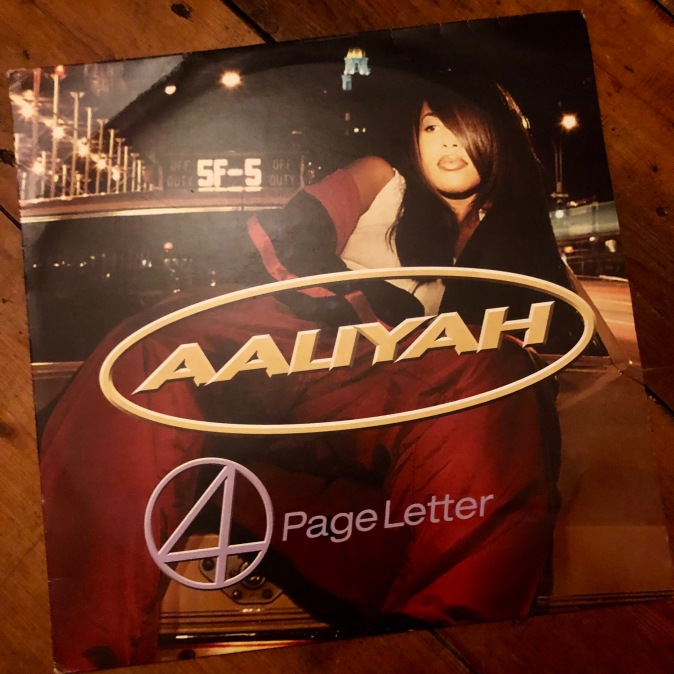
The symposium will seek to address this ongoing development, within the scope of exploring the origins of this shift, its resultant successes and failures, its social activism and relationship to “Black Capitalism”, its identity politics and LGBTQ+ components, its saints and sinners and controversies old and new, and its oppositions to, and recuperations by, the establishment, in African-American and Afro-European contexts, and beyond.

The symposium will culminate with a rare opportunity to view the documentary “Aaliyah Live in Amsterdam”, introduced (and with a Q&A) by its director, Dr. Pogus Caesar: “In 1995, Windrush Productions gained exclusive access to the Amsterdam leg of Aaliyah’s European tour. As well as capturing live footage of the concert, Aaliyah and her late father agreed to be interviewed, in a series of intimate conversations, they speak openly about her musical influences, achievements hopes and dreams. The film captures a star in their ascendancy. As the story unfolds it provides fans with a rare insight into Aaliyah, and leaves us wondering how much she would have achieved had her life not been tragically cut short.” Trailer: https://youtu.be/en99KwuxzC8
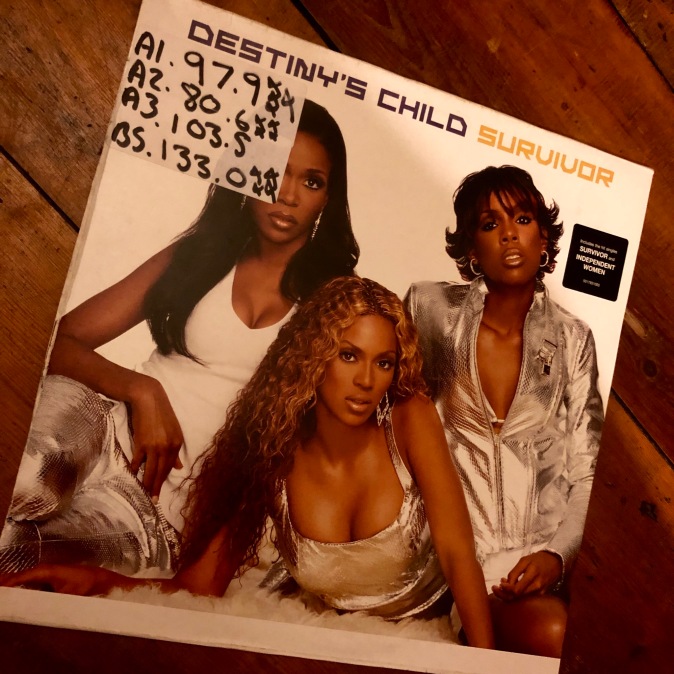
The symposium will include two keynote lectures. Firstly, from Dr. Kirsty Fairclough (Associate Dean, Research & Innovation, Schools of Arts & Media, University of Salford;https://drkirstyfairclough.co.uk/about/), “I Slay: Beyonce as Intersectional Feminist, Activist and Diva”.
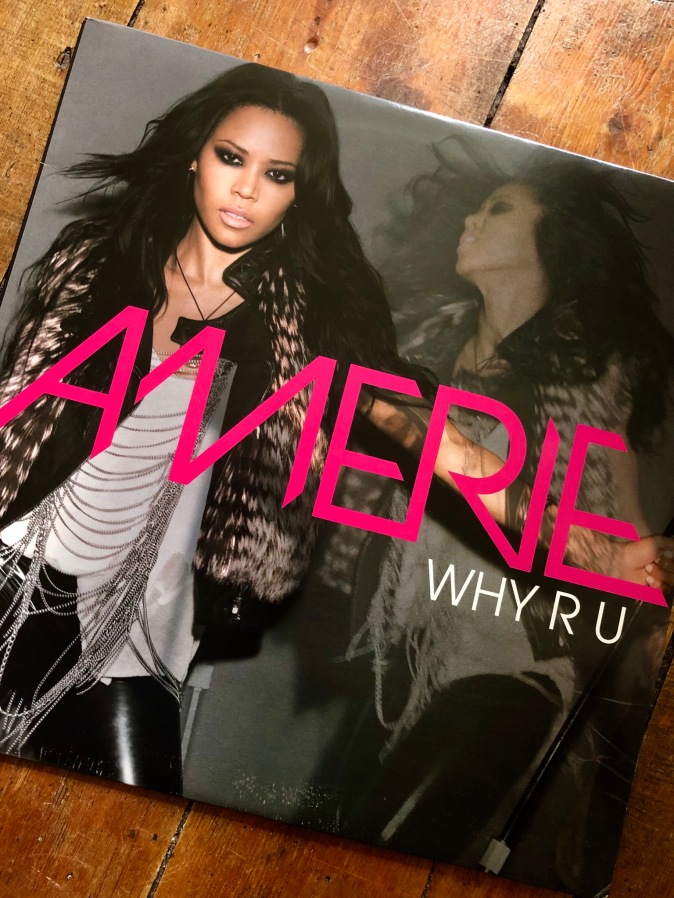
Secondly, from Dr Shara Rambarran (Queen’s University, Canada;www.shararambarran.com), “Proceed with Caution: Mariah Carey – the Ultimate Diva and Womxn Empowerment Influencer in Current Popular Music and Culture?”
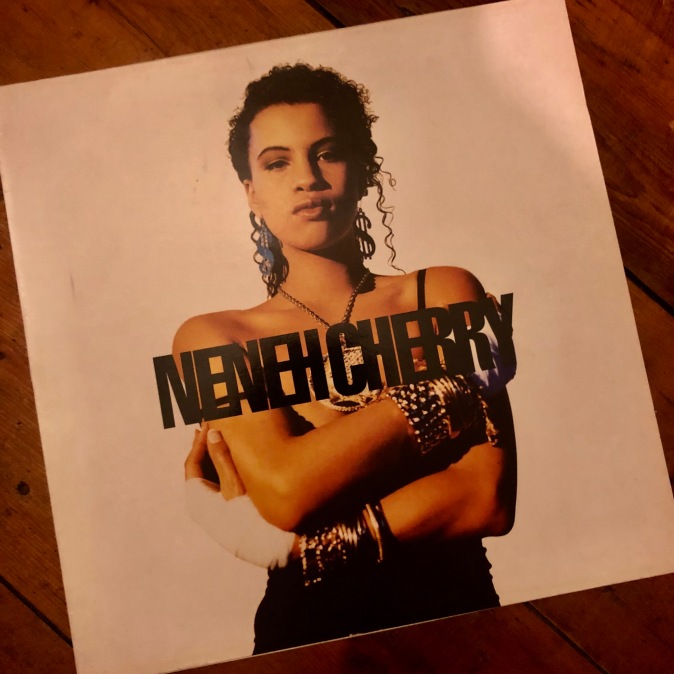
Proposals for presentations (individual and panel) and interventions should be emailed to Dr Benjamin Halligan (b.halligan@wlv.ac.uk) by 14 June 2019. (Word format, 200-300 words, minimal formatting, including biog note and contact information). Areas to be considered can include (but are not limited to) all music-related matters identified above, the evolution of the figure of the diva, trans cultures and fierceness and diva-ism, media around diva superstars (documentaries, tabloid exposes, MTV and post-MTV music videos, star identity formations, intimacy and interviews), confessions and hagiographies, #MeToo, and all other cultural practices that resonate with this development (fine arts, poetry and literature, DJ cultures and dance, film and television), and the protean nature of feminism, and black feminism, and second to third waves of feminism, that have arisen.
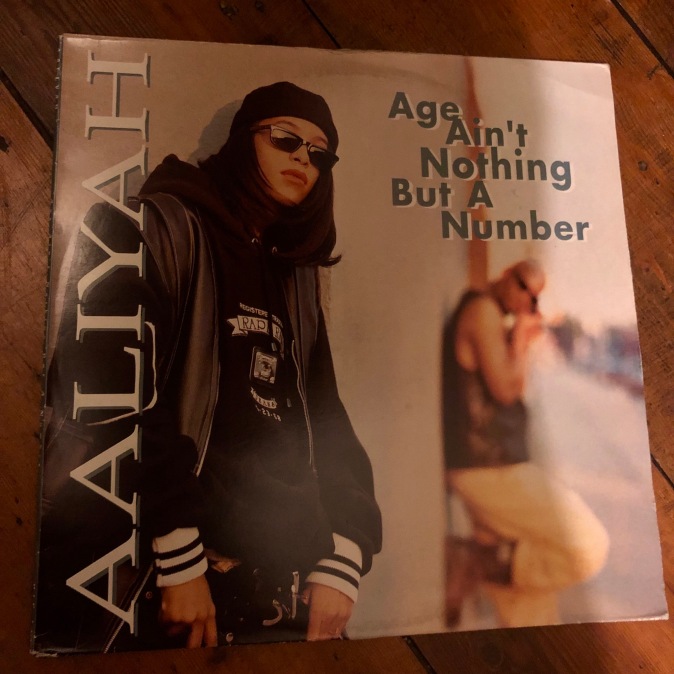
The symposium, which is hosted by the Centre for Film, Media, Discourse & Culture, University of Wolverhampton, will run on 17 July 2019. The registration fee will be £30 (£15 for unwaged, free for all postgraduate researchers). A limited budget is available to reimburse childcare costs, upon application, if that will enable attendance: please enquire. The full programme, and booking details, will be published by 24 June 2019.
**Booking information, and further guest announcements, forthcoming**
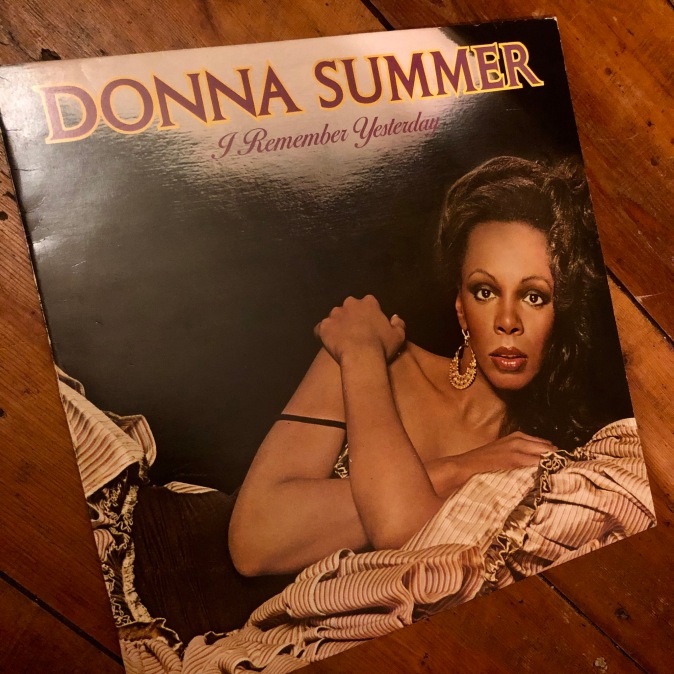
Dr Pogus Caesar is a conceptual artist utilising multiple media. He was born in St Kitts, West Indies, and grew up in Birmingham, England.
In 2018 Caesar was awarded an Honorary Doctorate by Birmingham City University for his outstanding contribution to the visual arts.
He has documented prominent figures and historical events such as the Handsworth Riots in 1985, a significant period of social unrest. He often reworks 35mm negatives into new forms, challenging the notion of religion, sex, history and identity from a Black British perspective. Caesar has also had a successful career in television producing and directing programmes for Carlton TV, Central TV and BBC.

Considered an important visual record of black history, Caesar’s work has been exhibited widely and his photographs and artworks have been acquired by National Portrait Gallery, Victoria & Albert Museum, Mappin Art Gallery, Wolverhampton Art Gallery and Birmingham Museum and Art Gallery.
Dr Kirsty Fairclough is Associate Dean: Research and Innovation in the School of Arts and Media at the University of Salford, UK. She is the co-editor of The Music Documentary: Acid Rock to Electropop (Routledge), The Arena Concert: Music, Media and Mass Entertainment (Bloomsbury) and Music/Video: Forms, Aesthetics, Media (Bloomsbury), and co-author of the forthcoming The Purple Papers: Prince, An Interdisciplinary Life.  Her work has been published in Senses of Cinema, Feminist Media Studies, SERIES and Celebrity Studies journals. Kirsty recently developed the University of Salford Popular Culture Conference series which has included “I’ll See You Again in 25 Years: Twin Peaks and Generations of Cult Television”, “Mad Men: The Conference”, and in May 2017, “Purple Reign: An Interdisciplinary Conference on the Life and Legacy of Prince”. https://drkirstyfairclough.co.uk/about/
Her work has been published in Senses of Cinema, Feminist Media Studies, SERIES and Celebrity Studies journals. Kirsty recently developed the University of Salford Popular Culture Conference series which has included “I’ll See You Again in 25 Years: Twin Peaks and Generations of Cult Television”, “Mad Men: The Conference”, and in May 2017, “Purple Reign: An Interdisciplinary Conference on the Life and Legacy of Prince”. https://drkirstyfairclough.co.uk/about/
Dr. Shara Rambarran an Assistant Professor of Music at the Bader International Study Centre (Queen’s University, Canada), and is a writer and editor. Shara co-edited the Oxford Handbook of Music and Virtuality with the late Professor Sheila Whiteley (the first Professor of Popular Music in the United Kingdom). Shara is passionate in researching on: remixology/post-production, digital technology, virtuality, electronica/dub, reggae, hip-hop, pop production, audio-visual aesthetics, media, cultural/critical theory, music industry, music education, and law.
Shara co-runs the Art of Record Production conferences, and serves on the journal editorial boards for The Art of Record Production and Journal of Popular Music Education.
http://www.shararambarran.com

